Going Beyond Wordle: Oodles of *dle Games
Wordle has taken the Internet by storm. It skyrocketed from a handful of players late last year to millions today, with the New York Times acquiring the game from creator Josh Wardle for a reported seven-figure sum. Wordle gameplay is simple—every day, you have six opportunities to guess a randomly selected five-letter word. We explained it early in the year in “How to Play Wordle, the Word-Guessing Game of 2022” (7 January 2022).
Since Tonya and I are word people (and Tonya was a demon when playing the Boggle word game with her family growing up), we’ve taken to Wordle like definitions to a dictionary. Tonya decreed early on that we would always play separately, and no hints are allowed when one of us finishes before the other. (Though I must admit some glee in working subtle references to the answer into regular conversation throughout the day—she hasn’t yet connected any of those dots.) In contrast, my parents solve Wordle together every day.
Early on, Tonya and I started wondering about our guesses. Were they skillful, or just lucky? Happily, the New York Times came up with WordleBot, which analyzes your guesses, sets them against how a bot would play, and gives you some statistics to compare if you’re a highly competitive type. It’s interesting background if you’re curious to peek behind the curtain. After you finish a game of Wordle, navigate to WordleBot in your browser to have it look at your results. (You can also upload a screenshot, but that’s fussy.)
WordleBot is frustrating to invoke if you, like me, created a Home screen icon for Wordle on your iPhone since Apple encapsulates the website so that it doesn’t share cookies with Safari. You can’t bring up the Safari address bar or bookmarks within Wordle’s saved Home screen icon to navigate to WordleBot after playing. It would be nice if the New York Times would add a link to WordleBot from Wordle itself—I’ve suggested it to them directly—but until that happens, here’s a workaround:
- At the end of your Wordle game, tap the hamburger menu at the top left.
- Tap the link at the bottom for “The New York Times” to go to the paper’s home page. Reading headlines at this point is not recommended.
- Tap the hamburger button at the top left of that page, and search for “WordleBot.”
- Tap the first item in the search results to load WordleBot.
The brilliance of Wordle is that it can be either easy or hard, depending on how well you can sort through possible words in your head. Some days, I can solve Wordle in a minute or two; other days, I must laboriously check numerous combinations of letters. I haven’t failed yet, but luck plays a role. I have gone down to the six-guess wire a few times when faced with multiple options for words that differ by only a single unknown letter. But no matter how long it takes, you’re done for the day once you enter the solution. Finitude is rewarding.
Unsurprisingly in today’s massively interconnected world, Wordle has served as inspiration for numerous similar guessing games. Some merely force all guesses to come from a limited set of words, but I find them uninteresting—my brain doesn’t segment words by category, so it’s frustrating to think of words that can’t work. A sampling:
- A Greener Worldle: words related to the environment and climate change
- Dundle: four-letter words associated with The Office
- Foodle: food-related words
- Gordle: last names of NHL hockey players
- Lewdle: naughty words
- Lordle of the Rings: five-letter words, including names, from the book
- Sweardle: the original four-letter words
- SWordle: Star Wars words
- Taylordle: a Taylor Swift-themed Wordle clone, however that works out
More interesting are the guessing games that change the concept or ask you to guess something other than words. Here are some we’ve tried.
Dordle, Quordle, and Octordle
Whether it’s the old Qubic three-dimensional Tic-Tac-Toe game or Kirk and Spock playing 3-D chess in the original Star Trek, there’s something compelling about multiple interrelated game boards. Dordle, Quordle, and Octordle let you play two, four, or eight games of Wordle simultaneously, with each guess filling in the appropriate letters on each board. You get more guesses, too—7, 8, and 13, respectively.
These games are harder, needless to say, and can benefit from a strategy that plays as many letters as possible early on. But they aren’t as hard as they seem because a guess that tells you little on one board may be extremely useful on another. Tonya plays Quordle regularly—I play only sporadically. We usually win, but failure does happen. If you’ve found Wordle too easy, try one of the multiple board variants.
Squareword
As long as I’m invoking childhood board games, there was also Connect 4, which challenged players to connect four discs in another version of Tic-Tac-Toe. I thought of it the first time I encountered Squareword, which uses Wordle gameplay on a five-by-five grid. You try to guess the horizontal words, but all the verticals must also be valid five-letter words. Needing to complete the vertical words adds a nice fillip to the game, which challenges you to solve the puzzle in less than 8, 11, 16, or 21 guesses—there’s no limit to the number of guesses you can make.
We consider seven guesses to be “winning,” and it’s hard since you have to complete each horizontal word, which usually entails five guesses. It’s possible to do it in fewer guesses if you can work a necessary completion letter for one word into the right spot in another, but that’s uncommon. My main irritation with Squareword is that its indication of a <8 score is a green circle with a yellow ring, making it nearly indistinguishable from the pure green <11 score. Why not blue or something completely different?
Hurdle
Rather than make you play multiple Wordle games simultaneously, Hurdle forces you to play five games sequentially. The twist is that the solution from each of the first three boards is used as the first word for the next board, and the fifth and final Hurdle board will be pre-filled with all the answers from the previous four boards, giving you only two guesses to arrive at the solution. Losing the option to specify your first word isn’t a problem, but being limited to just two guesses on the final board can be tough.
WordHurdle, More Wordle, Hello Wordl, Speedle
If Wordle’s five-letter guesses and answers are too easy for you, give WordHurdle, More Wordle, or Hello Wordl a try. WordHurdle switches to a six-letter grid and keeps the number of guesses at six. More Wordle offers three modes accessible from its gear menu: Easy (five letters, six guesses, just like Wordle), Medium (six letters, seven guesses), and Hard (seven letters, eight guesses). Hello Wordl is even more flexible, allowing you to choose games that employ anywhere between 4 and 11 letters, but it keeps the number of guesses at six. Speedle forks Hello Wordl to let you play multiple timed games in a row with numerous customizable options.
Antiwordle
Try not to think of a penguin. I suspect that as soon as you read the word “penguin,” an image of a thoroughly amusing flightless waterbird waddled into your mind. In another crowd, it might have been Tux.
That’s roughly the idea behind Antiwordle—you have to play Wordle while trying to avoid guessing the final word. Like Squareword, you have unlimited guesses; unlike Squareword, the more guesses you make, the better you’ve done. Tonya’s best game required nine guesses, and mine needed seven; it’s hard to progress past six. Perhaps it’s another way I’m bad at Zen, but I don’t enjoy thinking of something that’s not.
Antiwordle requires a completely different strategy since you want each guess to use as few letters as possible, thus leaving open as many options as possible. MUMMY, CIVIC, and TOOTS are all good words that consume only three letters each. However, once your letters start hitting, you’re in straight Wordle-land, and luck plays a larger role. If you get to letters like SHA_E, you might be able to draw out the game by guessing SHAVE, SHAME, SHARE, SHAPE, SHALE, SHADE, and SHAKE in an order that winnows out everything but the final answer.
Absurdle
If you want even more human-on-bot competition than Antiwordle offers, try Absurdle. Unlike all the Wordle variants discussed so far, Absurdle doesn’t know the answer in advance. Instead, Absurdle evaluates your guesses and tries to reduce the set of possible answers as little as possible. It’s adversarial Wordle—Absurdle is actively working to stymie your efforts to get to an answer.
Of course, you will eventually be able to corner Absurdle and force it to admit defeat; the question is now many guesses you’ll have to employ to extract the answer. I mostly play Absurdle when I’ve had a bad day and want to take out my irritation on an uncomplaining bot.
Squabble
Who needs bots when you can take on other humans in multiplayer Wordle action? That’s the idea behind Squabble, which lets you solve Wordle puzzles in two competitive modes: Blitz and Squabble Royale. In Blitz, you compete with 2–5 players; in Squabble Royale, you’re battling with 6–99 players. Squabble is anything but relaxing since correct guesses deal damage to other players, whereas incorrect guesses cause you to take damage. Plus, you take 1 damage point every second, so you want to guess right quickly. I’ve only tried Squabble a couple of times—I don’t need that kind of stress in my life. Squabble works only on a large-screen device, and I can’t imagine playing it without a keyboard.
Waffle
Waffle looks like Squareword, with a five-by-five grid, although Waffle has four holes in the grid, resulting in just six words to guess. Instead of making you guess from scratch, Waffle provides all the letters you need, marking the ones in the right place in green and those in the wrong place in yellow. Rather than type words, you drag the letters around, swapping a white or yellow letter for another one to complete all the words. Every Waffle game can be solved in 10 moves and must be solved in 15; you get stars for however many moves you have left once you’re done. I find Waffle more relaxing than the traditional Wordle gameplay because it’s more about seeing patterns than searching through my internal word list for matches.
Semantle
And now for something completely different! Semantle comes up with a target word every day, but unlike all the previous games, you find it by guessing semantically related words. For each guess, Semantle tells you how close you’re getting with a numerical score. There are no limitations when it comes to the type of word or part of speech, so if the word is QUIET, guessing WHISPER might be somewhat close, but SILENT will be even closer.
The problem with Semantle is that it can take quite some time as you throw random words at it to get started. My fastest solution was 24 guesses, but I had another one that took 144 guesses and was really starting to get on my nerves.
Mathler, Nerdle
If you think better in numbers than words, you can count on Mathler and Nerdle for a good time. Mathler gives you a number and asks you to write an equation to solve it while staying within the basic Wordle rules. Nerdle ups the ante by requiring you to figure out the entire equation, including the equal sign. Order of operation matters, so you have to multiply and divide before adding or subtracting. Mathler is a little easier since you know where you’re going. I can solve these puzzles, but as someone who has always preferred words to numbers, I don’t inherently enjoy the process.
Worldle, Globle
Worldle gets points for double wordplay, given that it roughly follows Wordle rules but translates everything to an image matching game where the images are those of countries or territories. How well do you know your maps? As you guess—helpfully, Worldle auto-completes country and territory names—Worldle gives you a closeness score of 1 to 5 and tells you how far off you are in kilometers and direction, with an arrow pointing toward the answer. Try to home in on the answer in six guesses.
Globle uses a similar approach, asking you to guess a particular country every day. Unlike Worldle, however, Globle colorizes each guess on an interactive globe with four levels of closeness. The real problem with Globle is that it doesn’t auto-complete country names (although suggestions from the iOS keyboard can help). Good luck spelling Kyrgyzstan on your first try. You can guess as many times as necessary, though that may just prolong the agony of ignorance.
A friend likes Worldle because it helps her improve her geographical knowledge, but I find both games frustrating, particularly when the place in question is an island. Can you tell the difference between Tuvalu and the Faroe Islands?
Heardle
Don’t even think about playing Heardle unless you’re under the age of 30 and stream popular music regularly. Heardle takes its cue from the Name That Tune game show that premiered on radio in 1952, moved to television in 1953, and has since been revived more times than a Marvel superhero. It plays bits from the intros to songs that are among “the most streamed songs in the past decade” and challenges you to, well, name that tune in six guesses. At least it gives you suggestions as you type. When I fail, and I’ve failed completely every time I’ve played, I discover that not only do I not know the song in question, I’ve never even heard of the artist. It might be fun if I could limit it to music from the 1970s and 1980s, but otherwise, I want Heardle off my lawn.
Framed
Are movies more your thing? I mean, really your thing? You might stand a chance with Framed, which uses the traditional six guesses approach with individual frames from a movie. In essence, it’s Name That Film. I’m not a movie buff, so my every try at solving Framed has ended in ignominy. I know the names of many movies that I haven’t seen, but I have no idea what they look like, and Framed doesn’t give clues, just more frames from the movie.
Other Wordle-Inspired Games
During my research, I ran across even more Wordle-inspired guessing games. Some that I found utterly bewildering included:
- Adverswordle, which has something to do with making the bot guess
- Box Office Game, in which you try to name the five top-grossing movies from a random week
- Cloudle, which asks you to guess the next five days’ weather forecast for a random city
- Crosswordle, which runs Wordle in reverse, forcing you to identify guesses that lead to the provided answer
- Dungleon, which replaces letters with fantasy character pieces and has secret rules
- Murdle, which combines Wordle with Hangman
- Passwordle, in which you see why password cracking is done by computers
- Squirdle, which has you attempt to guess at Pokémon characters
- Who Are Ya?, which challenges you to guess football (soccer) players
As I was nearing what I thought was the end of this article, I stumbled upon Wordles of the World, a site that attempts to be comprehensive with its list of (so far) 762 Wordle-like games and resources in 149 languages. I think I need to go lie down now. And maybe play a simple game of Wordle.
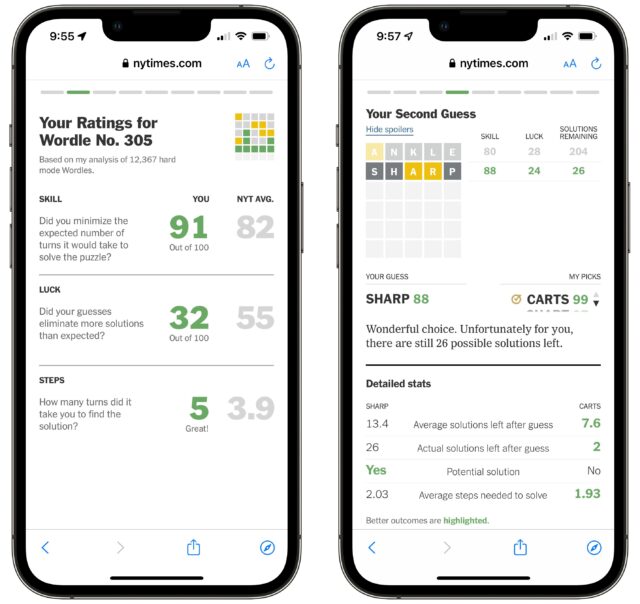
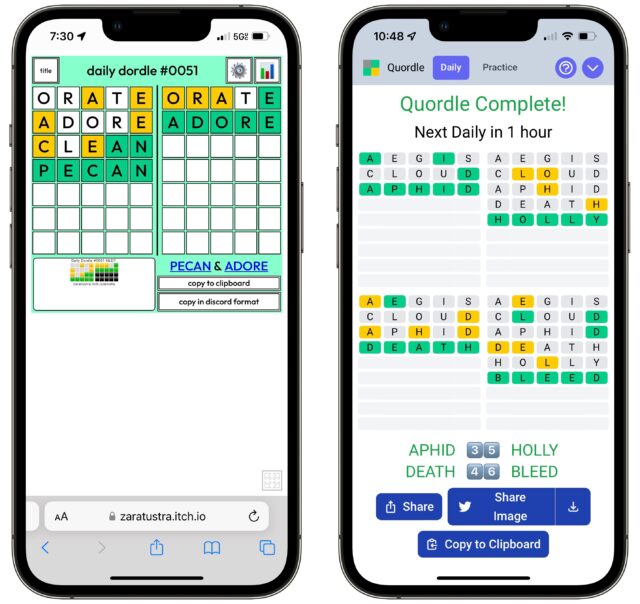
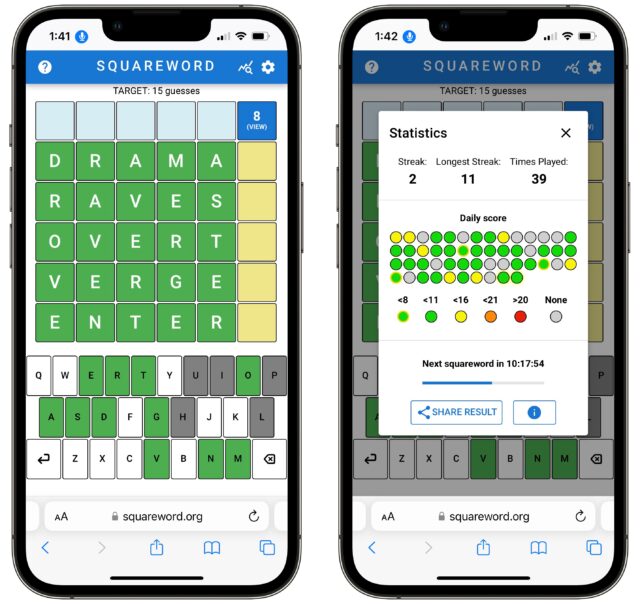
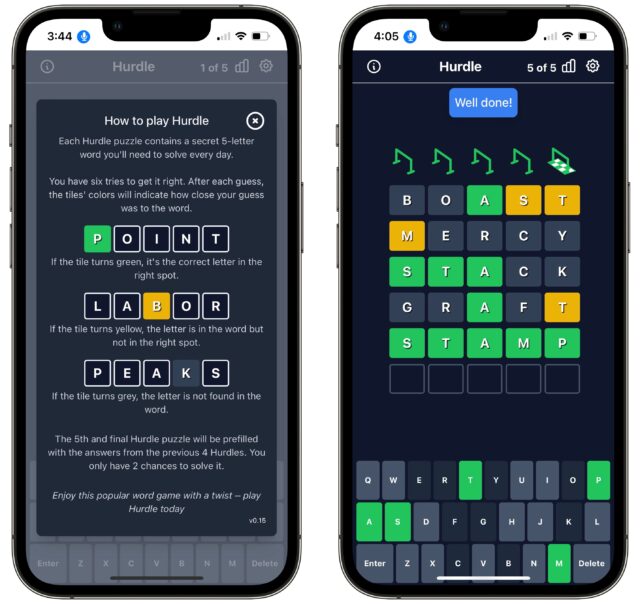
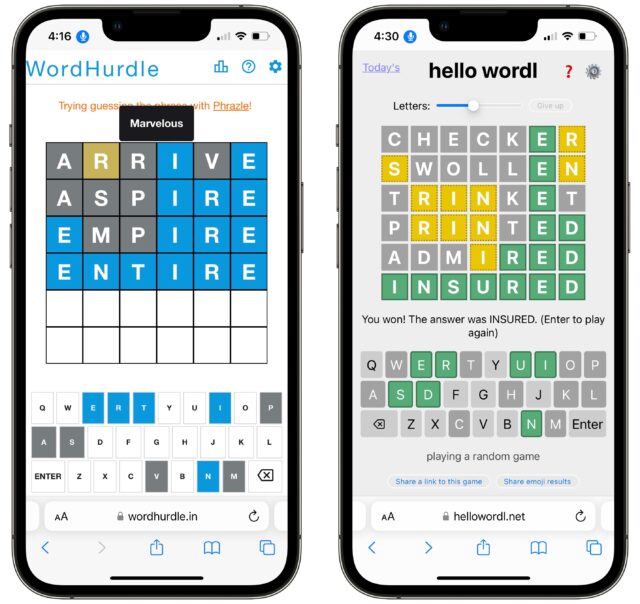
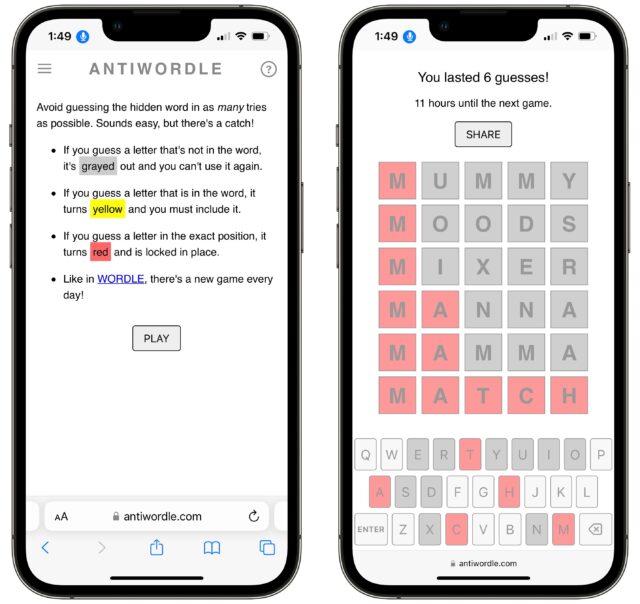
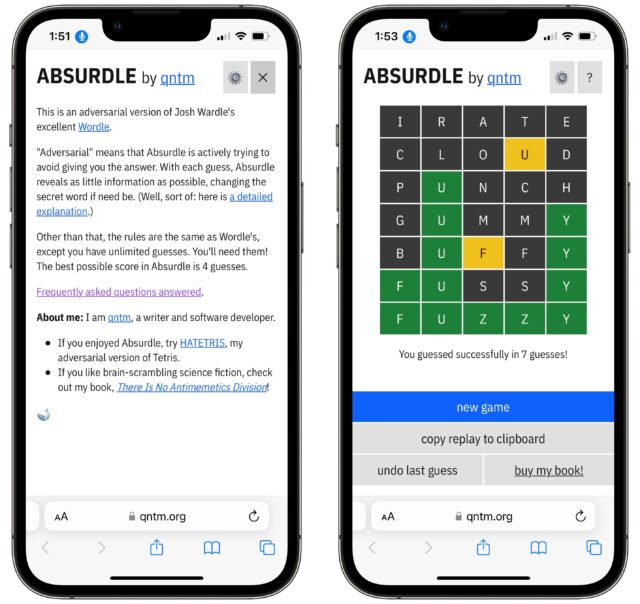
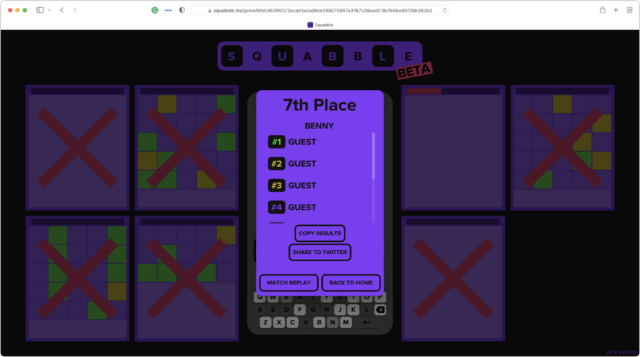
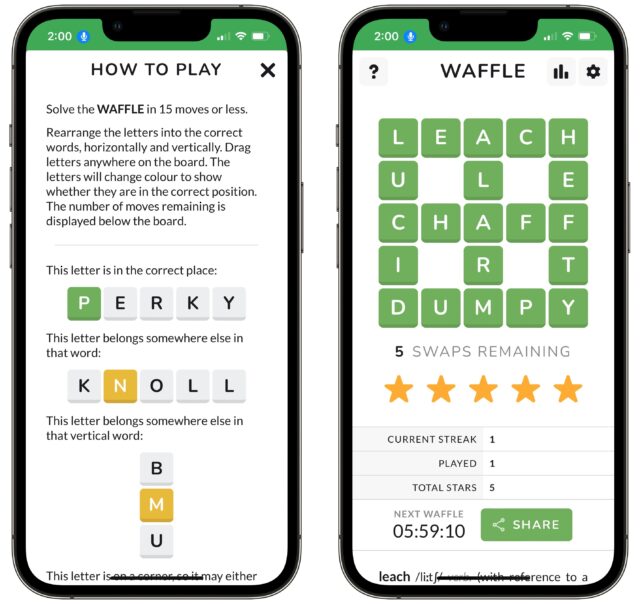
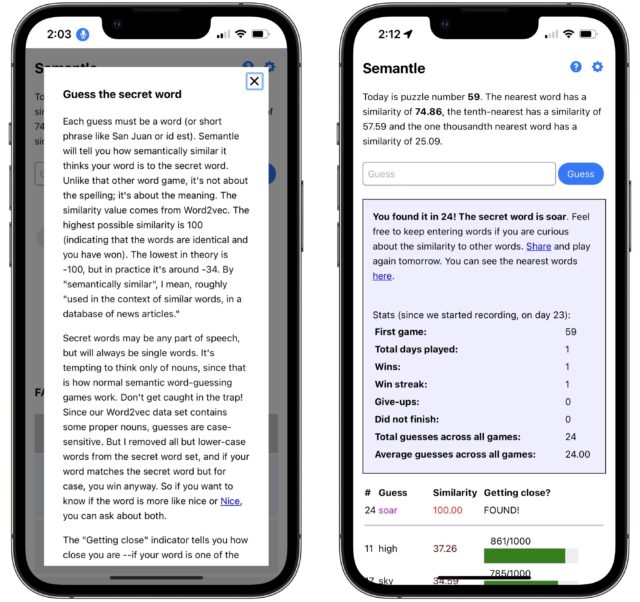
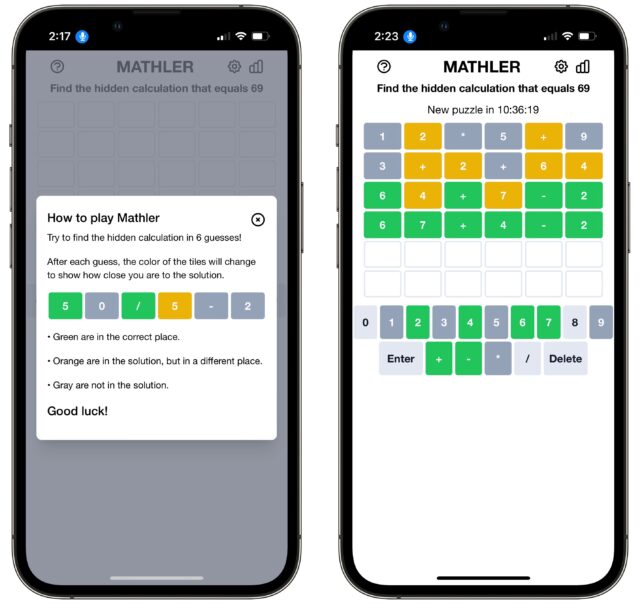
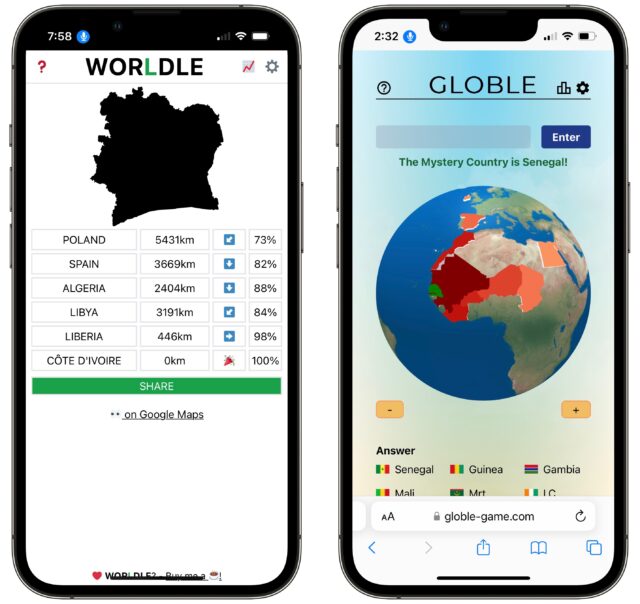
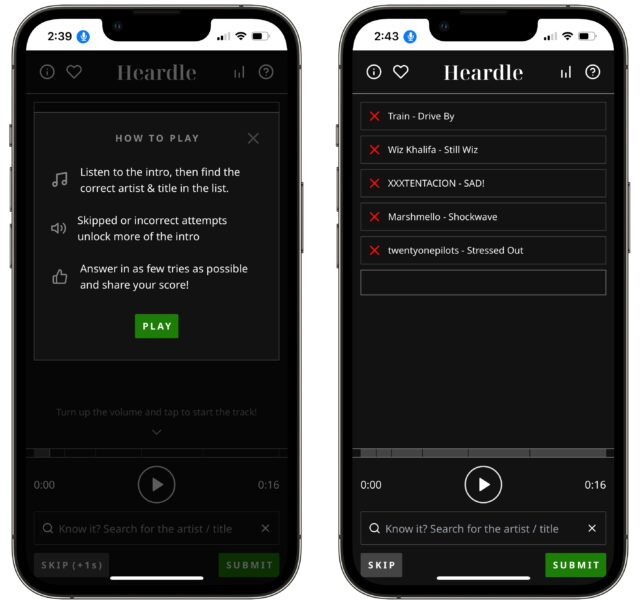
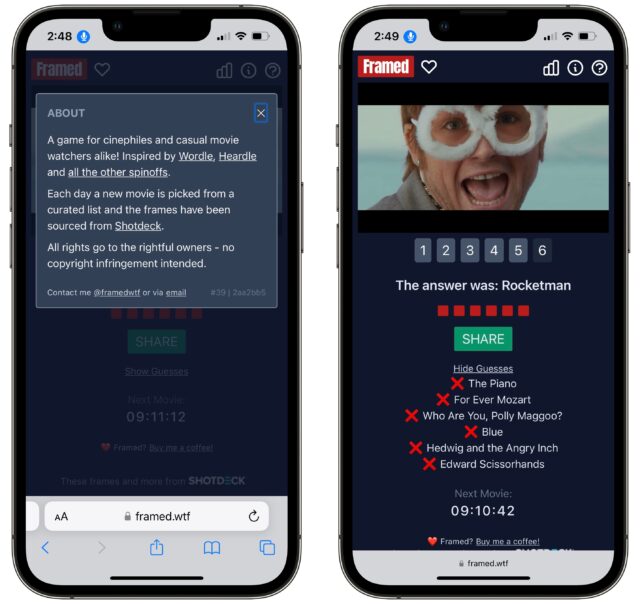
Favorite is Cloudle | Cogit
Wordle tip that I learned from the Wordle Bot (in normal mode):
When you’re faced with the situation where you have 4 letters correctly placed, but several choices for the last letter, make a guess that uses the most popular possible choices for that 5th letter. Only one of the letters will be green or yellow. Of course, you can leave out one of the possible choices, and it will be your choice if none of the others are possible.
It uses up one turn, but it’s better than just flinging guesses for the missing spot.
Found one called Explordle that shows videos from around the world and you have to figure where you are. https://www.explordle.com/
I’ve done better than I expected just by picking up on small clues.
Wordle is genius. I do not like crossworld puzzles or any other word game I’ve seen or tried despite my love for words. There are very few games I like for various reasons which are often: they take too long, or just aren’t interesting to the brain. I’ve never tried to solve Rubik’s Cube so I don’t even know if I don’t like it. I do love things like multiple choice quizzes about almost any topic - maybe Wordle is a little of that. I mix up my Wordle strategy a bit and always start with a different word. The one or two times I didn’t solve in six, I think, was when I had all letters in order but one, and there were about five different valid words to choose from. So far, I’m not tiring (the one a day limit is part of the genius) although I’m sure I will. Shuffle looks ok to try but none of the others is obviously appealing at a glance. Thanks for writing about Wordle! (Ha - it’s midnight - time for Wordle!)
Thanks for the link to Wordlebot. I never would have known about it otherwise. And it suddenly justified my habit of taking screenshots of all my solutions! I learned something very interesting about the game: not all valid guesses are potential solutions. There was a game where, after two guesses, I narrowed the number of possible solutions to one. My next guess was FLAPS, but that’s not one of the 2309 Wordle solutions.
I’m not sure what to do with this new revelation. Should we consult the list before making a guess? Is that cheating? Are we supposed to intuit what is a valid solution and what isn’t? It’s 3:30 in the morning. (I have a bad habit of playing Wordle when I wake up in the middle of the night.) I’ll have to think about this in the light of day.
I just found out about the WordleBot last week. If there is one thing about the WordleBot that I dislike, it’s that. I want no prior knowledge of what the different solutions will ever be, and I don’t think the bot should know what they are, either. I ignore that part of the analysis.
Yeah, it’s useful to know that there are 10,000-some possible legitimate words, but only 2,309 possible solutions. The game’s creators did that so you wouldn’t feel “cheated” by having the solution be a truly obscure word that few people had ever heard. They also felt that plurals weren’t sporting, so such words aren’t possible solutions. Plus, the New York Times took out a few naughty words.
I’m mostly intrigued by WordleBot’s evaluation of my luck and skill.
Musicle is a musical version, easier than Heardle (you get a longer sample and four aternatives to choose from) and with the possibility to choose categories like for example 80s music, jazz or even national anthems: https://musicle.app. It’s Brazilian in origins and it uses Apple Music for the song samples and album covers. Highly recommended!
I’ve not seen the list of solutions, but so far there has never been a solution that is a noun made plural with an S on the end or a verb put into the past with an ED on the end (like “ended”). I did miss playing a few days back in January, so I could be wrong about those days when I didn’t play.
I LOVE Wordle. Finally, a computer game that makes my neurons happy, and one that goes away after I play once, so I’m not fighting the temptation to play “just one more” all day.
Just a quick note that NYT has added a direct link to WordleBot to the “hamburger” menu so you don’t have to visit the times homepage and then search for it.
Excellent! It seemed like a painfully obvious improvement, and I had encouraged them to do it in direct email too, not that one ever knows if that helps.
I’ve become addicted to Dordle, Quordle, and Octordle. I find them a much more engaging challenge than the regular Wordle. I also really like Semantle, even though a lot of it is luck in hitting upon the right word to get you into the ballpark of the solution.
I’ve also been playing MoreWordle for the 6- and 7-letter words, but it annoyed me one day last week. The 6-letter answer word was PYJAMA—I was able to prove it by using PAJAMA for the next-to-last guess and PYTHON as my final guess—but PYJAMA itself was not regarded as a valid word to guess.
I attempted to contact the site about it, but there are no contact links available on the domain at all, and nothing that indicates who runs the game. I tried the standard help@, admin@, webmaster@, and so on, but all bounced, suggesting that the domain has no active email service attached to it.
That was literally the only word I’ve not gotten correct on any of the three difficulties of MoreWordle, so needless to say I’m unhappy that there’s no way to contact the game’s administrators about the fact that their answer list contains at least one word that’s not in the dictionary they validate guesses against. That kind of oversight has caused me to abandon other word games more than once—a word game that’s inconsistent about its dictionary can quickly become an exercise in frustration.
One interesting byproduct of WordleBot is that 30% of players now use DEALT as their first guess.
I saved the old Wordle URL to my Home Screen. Now that it’s no longer valid, is there any way to save my old stats?
I don’t think so. So far my old link still has a button that allows me to go to the new nytimes link, so my stats are retained. But web link favorites saved to to Home Screen have isolated cookies that can’t be transferred either to safari or to other links/icons saved to the Home Screen as far as I know.
There was a site that described how to transfer your stats if you changed devices. I used it to transfer my Wordle stats from my old iPad to the new one and it may help. If the format NYT uses is the same, it may work.
Speaking of WordleBot, is anyone else noticing that trying to access it recently is met by “you have reached your limit of free articles”? Did NYT put WordleBot behind their paywall?
I’m still able to access Wordlebot every day without a subscription.
You don’t need to be a subscriber, but you do have to have an “account”.
I noticed today they’ve added the ability to link your stats to a NYTimes account, including a free account. So you can either log in or create a new one and then you’ll be able to create a new Home Screen favorite from the proper link, log in to the account, and have your stats.
Done! I’ve made a new Home Screen app and it has my stats. Including my streak which apparently wouldn’t get transferred with the method @raykloss found. Now we’ll see how much junk email NYT sends me.